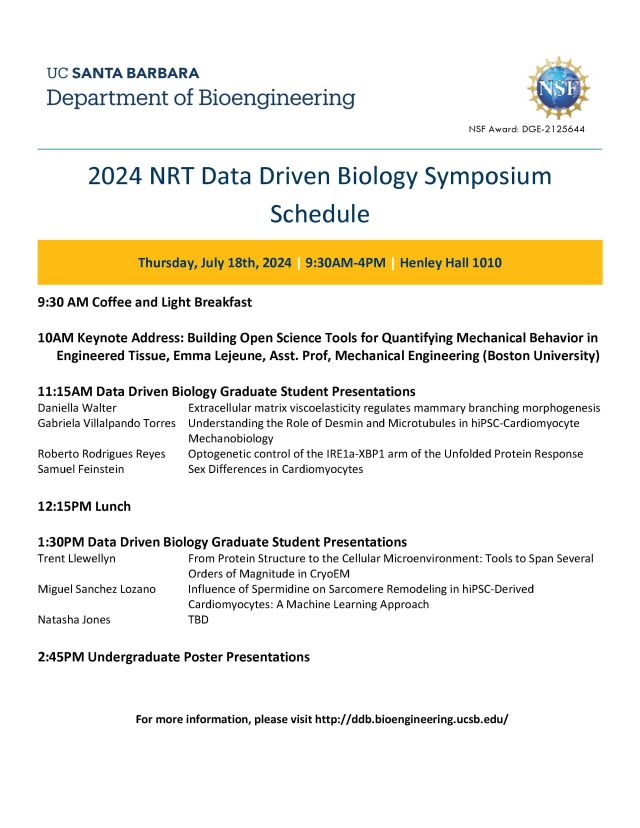Data Driven Biology Graduate Symposium - Thursday, July 18th 9:30am-4pm

Keynote Speaker: Emma Lejeune, Ph.D.
Assistant Professor of Mechanical Engineering, Boston University
Keynote Address: Building Open Science Tools for Quantifying Mechanical Behavior in Engineered Tissue
Abstract: From the beating heart to tissue assembly and repair, it is well accepted that mechanics plays an important role in the behavior of biological systems. Mechanical forces are not only fundamentally important to biological materials, but are also fundamental drivers of cellular behavior change. However, it is often difficult to determine mechanical state both in vitro and in vivo, and it is often difficult to determine how mechanical perturbations (e.g., changes to boundary conditions) will change the mechanical state throughout the domain. Over the past several decades, computational modeling has emerged as an important tool to bridge this gap. And, more recently, there has been a surge in interest towards using data-driven statistical techniques to create predictive models of biological system behavior. As experimental techniques and data-driven methods simultaneously advance, there is an unprecedented opportunity to gain biological insight. In this talk, we will describe our preliminary and ongoing work in developing open science tools for quantifying the mechanical behavior of engineered tissue with applications focused on both cardiac tissue engineering and wound healing. In brief, we envision a methodological framework with three essential components: (1) open access datasets of time-lapse movies of cells and tissue, (2) open source software to extract interpretable quantities of interest from these time-lapse movies, and (3) combined mechanistic and statistical models of biological behavior informed by these data. We are presently working on creating these datasets, software, and models in partnership with experimental collaborators, and releasing them to the community under permissive licenses. Looking forward, we anticipate that these large open access curated datasets combined with open source tools to extract information from them will enable significant advances in our ability to understand fundamental biological behavior and treat disease. Through this talk, we hope to foster further discussion and collaborations at the interface of mechanics, biology, and open science.
About the Speaker: Emma Lejeune is an Assistant Professor in the Mechanical Engineering Department at Boston University. She received her PhD from Stanford University in September 2018, and was a Peter O’Donnell, Jr. postdoctoral fellow at the University of Texas at Austin Oden Institute until 2020 when she joined the faculty at BU. At BU, Emma has received the David R. Dalton Career Development Professorship, a Computational Science and Engineering Junior Faculty Fellowship, the ASME Haythornthwaite Research Initiation Grant, the Extreme Mechanics Letters Young Investigator Award, and the AHA Career Development Award. Current areas of research involve integrating data-driven and physics based computational models, and understanding the mechanical behavior of heterogeneous materials.

DDB Graduate Symposium Schedule
9:30 AM Coffee and Light Breakfast
10AM Keynote Address: Building Open Science Tools for Quantifying Mechanical Behavior in Engineered Tissue, Emma Lejeune, Asst. Prof, Mechanical Engineering (Boston University)
11:15AM Data Driven Biology Graduate Student Presentations
Daniella Walter, Extracellular matrix viscoelasticity regulates mammary branching morphogenesis
Gabriela Villalpando Torres, Understanding the Role of Desmin and Microtubules in hiPSC-Cardiomyocyte Mechanobiology
Roberto Rodrigues Reyes, Optogenetic control of the IRE1a-XBP1 arm of the Unfolded Protein Response
Samuel Feinstein, Sex Differences in Cardiomyocytes
12:15PM Lunch
1:30PM Data Driven Biology Graduate Student Presentations
Trent Llewellyn, From Protein Structure to the Cellular Microenvironment: Tools to Span Several Orders of Magnitude in CryoEM
Miguel Sanchez Lozano, Influence of Spermidine on Sarcomere Remodeling in hiPSC-Derived Cardiomyocytes: A Machine Learning Approach
Natasha Jones, TBD
2:45PM Undergraduate Poster Presentations